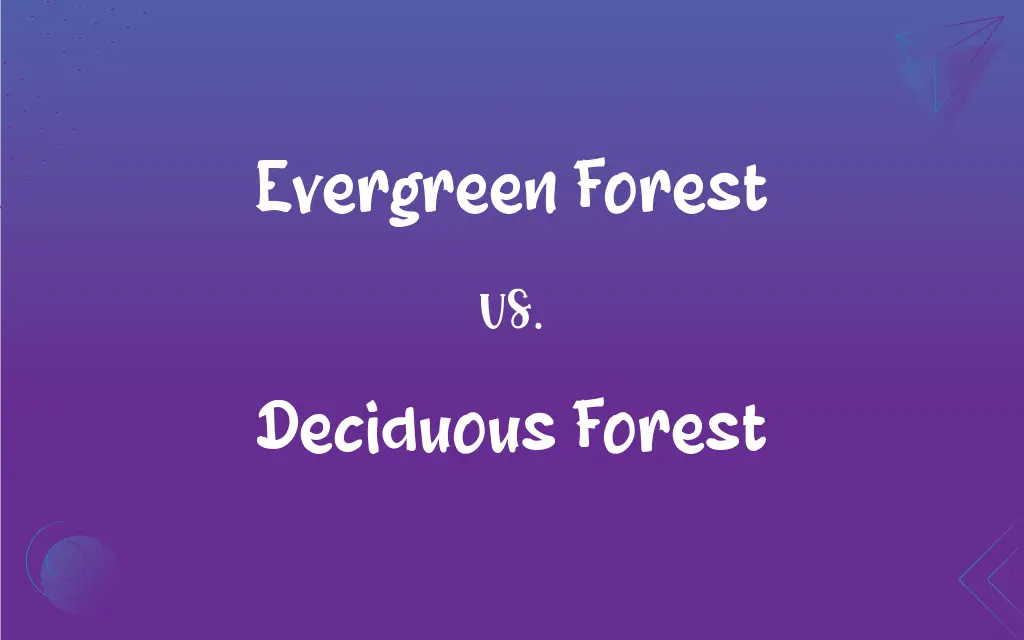Evergreen Forest vs. Deciduous Forest: What's the Difference?
Edited by Janet White || By Harlon Moss || Updated on October 23, 2023
Evergreen forests have trees that retain leaves year-round; deciduous forests' trees shed leaves annually.

Key Differences
Evergreen forests primarily consist of trees that keep their foliage throughout the entire year. This means that even during seasons where growth is less active, these trees remain green. Deciduous forests, on the other hand, are made up of trees that shed their leaves once a year, typically during the fall, in preparation for the winter.
In evergreen forests, the continuous presence of leaves allows these trees to photosynthesize all year long, given suitable conditions. This characteristic can be an adaptation to environments where resources are consistently available. Deciduous forests, contrastingly, face a period of dormancy. The shedding of leaves in these forests is a survival strategy to conserve water and energy during harsher, colder months.
When one explores an evergreen forest, the dense canopy and consistent shade are immediately noticeable. This kind of environment supports unique understory plants and animal life. In a deciduous forest, the seasonal shedding creates a dynamic environment, influencing the types of species that can thrive. The forest floor often receives more light during leafless months, fostering different biodiversity.
Climate plays a significant role in determining the distribution of evergreen and deciduous forests. Evergreen forests tend to thrive in regions with consistent rainfall and more moderate temperature fluctuations, such as tropical rainforests. Meanwhile, deciduous forests are more common in temperate zones, where distinct seasonal changes occur.
Comparison Chart
Leaf Retention
Retain leaves year-round
Shed leaves annually
ADVERTISEMENT
Photosynthesis
Occurs throughout the year
Seasonally reduced
Adaptation Purpose
Consistent resource availability
Conserve water/energy in colder months
Typical Climate
Moderate temperature fluctuations
Distinct seasonal changes
Biodiversity
Consistent shade influences species
Seasonal light changes affect species
Evergreen Forest and Deciduous Forest Definitions
Evergreen Forest
Forest regions with trees that don't shed leaves seasonally.
Many animals rely on the evergreen forest's constant canopy for shelter.
ADVERTISEMENT
Deciduous Forest
Forests undergoing seasonal changes with leaf loss in colder months.
The deciduous forest's cycle offers unique ecological opportunities for diverse species.
Evergreen Forest
Forests with trees that maintain their leaves throughout all seasons.
The Amazon basin hosts a vast evergreen forest.
Deciduous Forest
Regions with trees that respond to seasonal changes by dropping foliage.
The deciduous forest experiences a burst of growth in spring after winter's dormancy.
Evergreen Forest
Wooded areas where foliage persists and remains green year-round.
The Pacific Northwest's evergreen forests are home to towering conifers.
Deciduous Forest
Forests with trees that shed their leaves in a particular season annually.
In fall, the deciduous forest showcases a spectrum of colors.
Evergreen Forest
Dense forests characterized by unceasing leaf retention.
Evergreen forests provide habitats for diverse flora and fauna.
Deciduous Forest
Wooded areas where trees enter a leafless dormancy period.
Many migratory birds nest in the deciduous forest during spring and summer.
Evergreen Forest
Woodlands with perennially green trees.
Evergreen forests are often found in climates with minimal temperature variation.
Deciduous Forest
Woodlands characterized by annual leaf shedding.
Hikers often prefer the deciduous forest in autumn for its picturesque views.
FAQs
How do deciduous forests adapt to changing seasons?
Deciduous forests adapt by having trees that shed their leaves during harsher seasons.
Do evergreen forests support biodiversity year-round?
Yes, evergreen forests provide consistent habitats, supporting biodiversity throughout the year.
Where are evergreen forests commonly found?
Evergreen forests are commonly found in regions with consistent rainfall and moderate temperature fluctuations.
What characterizes an evergreen forest?
An evergreen forest is characterized by trees retaining leaves year-round.
What colors dominate deciduous forests in the fall?
Deciduous forests showcase a range of reds, oranges, and yellows in the fall.
Are coniferous forests a type of evergreen forest?
Yes, many coniferous forests are a type of evergreen forest.
What causes the leaf color change in deciduous forests?
In deciduous forests, shorter days and cooler temperatures trigger leaf color changes.
Can evergreen forests be found in cooler regions?
Yes, some evergreen forests, like boreal forests, are found in cooler regions.
How do evergreen forests impact the water cycle?
Evergreen forests contribute to the water cycle by consistently transpiring water and supporting rainfall.
How do deciduous forests contribute to soil fertility?
Deciduous forests enrich the soil as shed leaves decompose and release nutrients.
Do deciduous forests exist in tropical regions?
Yes, there are tropical deciduous forests where trees shed leaves during drier seasons.
What benefits do deciduous forests offer to human populations?
Deciduous forests provide resources like timber, recreational spaces, and support watershed health.
Why do trees in deciduous forests shed their leaves?
Trees in deciduous forests shed leaves to conserve water and energy during colder months.
What types of trees typify evergreen forests?
Pines, firs, and spruces are typical trees in evergreen forests.
Are there mixed forests combining evergreen and deciduous trees?
Yes, mixed forests can have both evergreen and deciduous tree species.
Why are evergreen forests vital for the carbon cycle?
Evergreen forests absorb CO2 year-round, playing a crucial role in the carbon cycle.
How do seasons impact food availability in deciduous forests?
Seasons in deciduous forests influence food availability, with abundance in warmer months and scarcity in colder ones.
How do evergreen forests impact local climates?
Evergreen forests can regulate local climates by maintaining consistent shade and moisture.
Can one find evergreen forests at higher altitudes?
Yes, some evergreen forests can thrive at higher altitudes, adapted to cooler, consistent conditions.
How do animals adapt to deciduous forest environments?
Animals in deciduous forests often adapt by migrating, hibernating, or storing food.
About Author
Written by
Harlon MossHarlon is a seasoned quality moderator and accomplished content writer for Difference Wiki. An alumnus of the prestigious University of California, he earned his degree in Computer Science. Leveraging his academic background, Harlon brings a meticulous and informed perspective to his work, ensuring content accuracy and excellence.
Edited by
Janet WhiteJanet White has been an esteemed writer and blogger for Difference Wiki. Holding a Master's degree in Science and Medical Journalism from the prestigious Boston University, she has consistently demonstrated her expertise and passion for her field. When she's not immersed in her work, Janet relishes her time exercising, delving into a good book, and cherishing moments with friends and family.































































